MercoPress. South Atlantic News Agency
Politics
-
Wednesday, May 5th 2010 - 01:03 UTC
Two Royal Navy Nuclear Subs Allowed to Sea with “Serious” Potential Risk

Two Royal Navy nuclear submarines were allowed to sea with a safety defect putting the vessels at “serious” potential risk, it was revealed.
-
Tuesday, May 4th 2010 - 19:53 UTC
Falklands’ Stamps Commemorates Battle of Britain and 10 Spitfires Donation

A new stamp issue for the Falkland Islands and Ascension Island has been announced by Pobjoy Mint, commemorating the Battle of Britain and Churchill’s “Few”.
-
Tuesday, May 4th 2010 - 18:58 UTC
Kirchner Gets UNASUR Job; Mujica Admits “Political Cost” but Privileges Unity

Former Argentine president Nestor Kirchner was sworn Tuesday as Secretary General of the Union of South American Nations, UNASUR, following the consensus reached among the twelve country members overcoming differences of previous meetings.
-
Tuesday, May 4th 2010 - 05:55 UTC
President Lula da Silva Visits Montevideo for Talks with Mujica
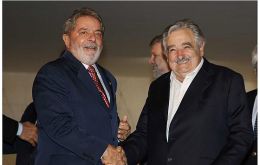
Brazilian president Lula da Silva is expected in Montevideo, Uruguay Tuesday afternoon to hold talks with his counterpart Jose Mujica, following the Unasur extraordinary presidential summit in Buenos Aires.
-
Tuesday, May 4th 2010 - 05:37 UTC
Lula da Silva Confirms Paraguay the Promised Power Line and Bridge
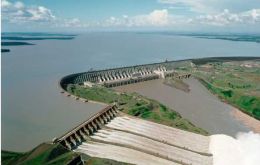
President Lula da Silva reassured Paraguay that Brazil will build the promised 500 kW power transmission line from the Itaipú dam to the capital Asunción, as well as a bridge over the Paraná River shared by both countries.
-
Tuesday, May 4th 2010 - 04:41 UTC
“Right to Know” Initiative on World Press Freedom Day

A new global access to information initiative launched Monday to mark World Press Freedom Day, will test how easy (or not) it is to obtain information from 30 governments on their anti-corruption efforts.
-
Tuesday, May 4th 2010 - 04:26 UTC
Bolivia, Chile, Argentina and Peru Coordinate Mine Clearance Activities
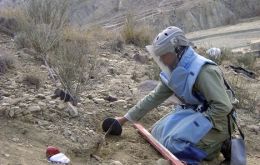
Defence officials from Bolivia, Chile, Peru and Argentina will be participating in a high level meeting to coordinate efforts for the elimination of anti-personnel mines which still remain in border fields of the four countries involved.
-
Tuesday, May 4th 2010 - 01:26 UTC
Kirchner Receives Unanimous Support to Become UNASUR Secretary General
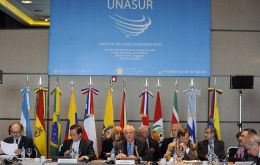
Former Argentine president Nestor Kirchner received Monday the unanimous support from country members of the Union of South American Nations, UNASUR, to become the organization’s secretary general, overcoming differences of previous meetings.
-
Monday, May 3rd 2010 - 20:48 UTC
Mockus and his “Green Tide” Upsetting Uribe-Santos Continuity in Colombia
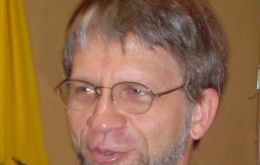
With less than a month for the Colombian presidential election the campaign has reaffirmed the surprising advance of what is known as the “green tide” of hopeful Antanas Mockus, who according to the latest public opinion polls figures ahead of incumbent candidate and former Defence Minister Juan Manuel Santos.
-
Monday, May 3rd 2010 - 20:31 UTC
Drug Traffickers, Cuba and FARC, Latam’s Main Predators of Press Freedom

There are 40 names on this year’s list of Predators of Press Freedom—40 politicians, government officials, religious leaders, militias and criminal organizations—that cannot stand the press, treat it as an enemy and directly attack journalists. They are powerful, dangerous, violent and above the law.
